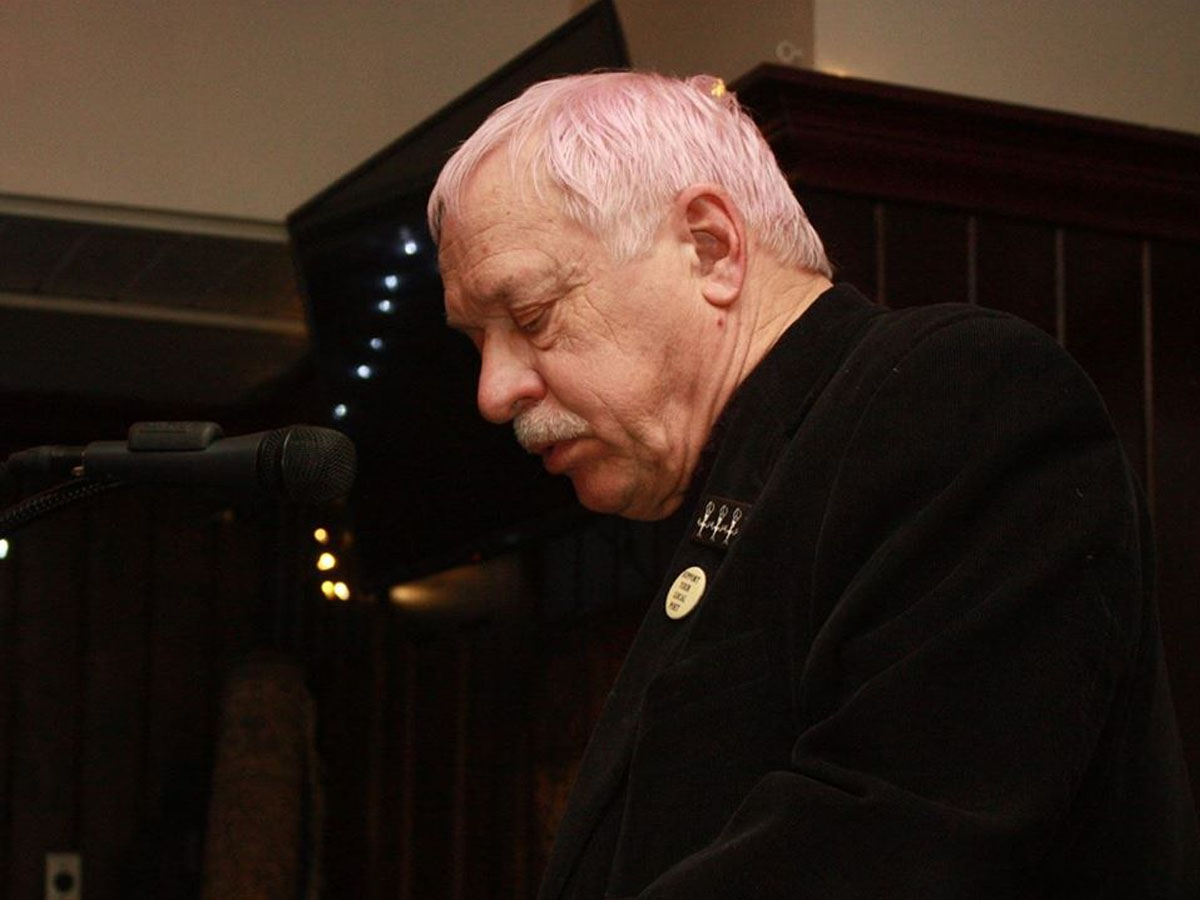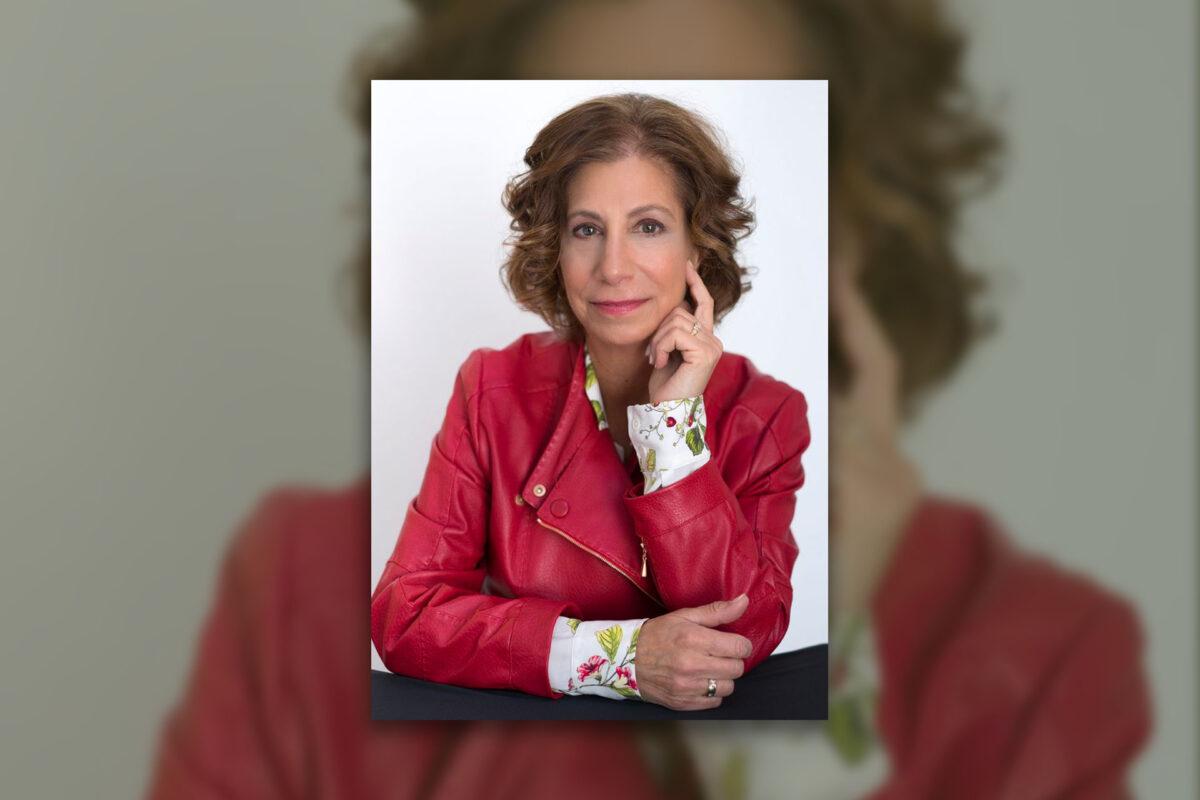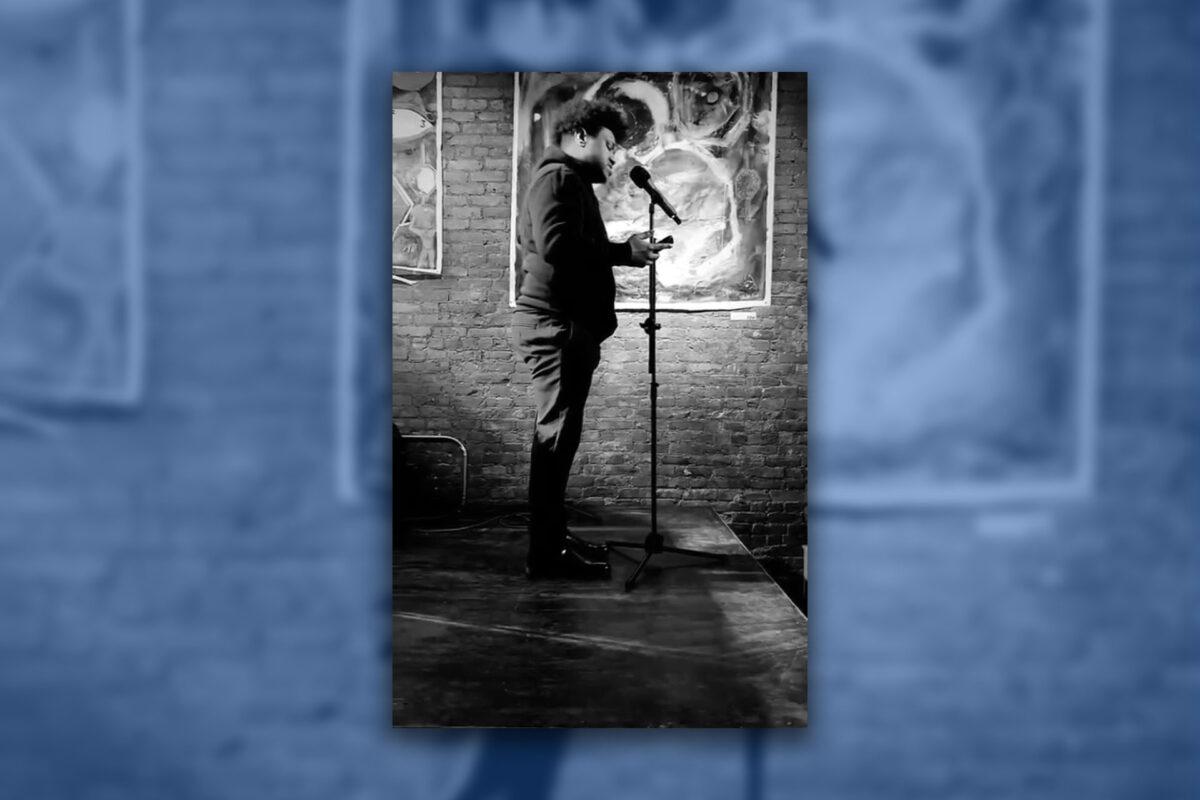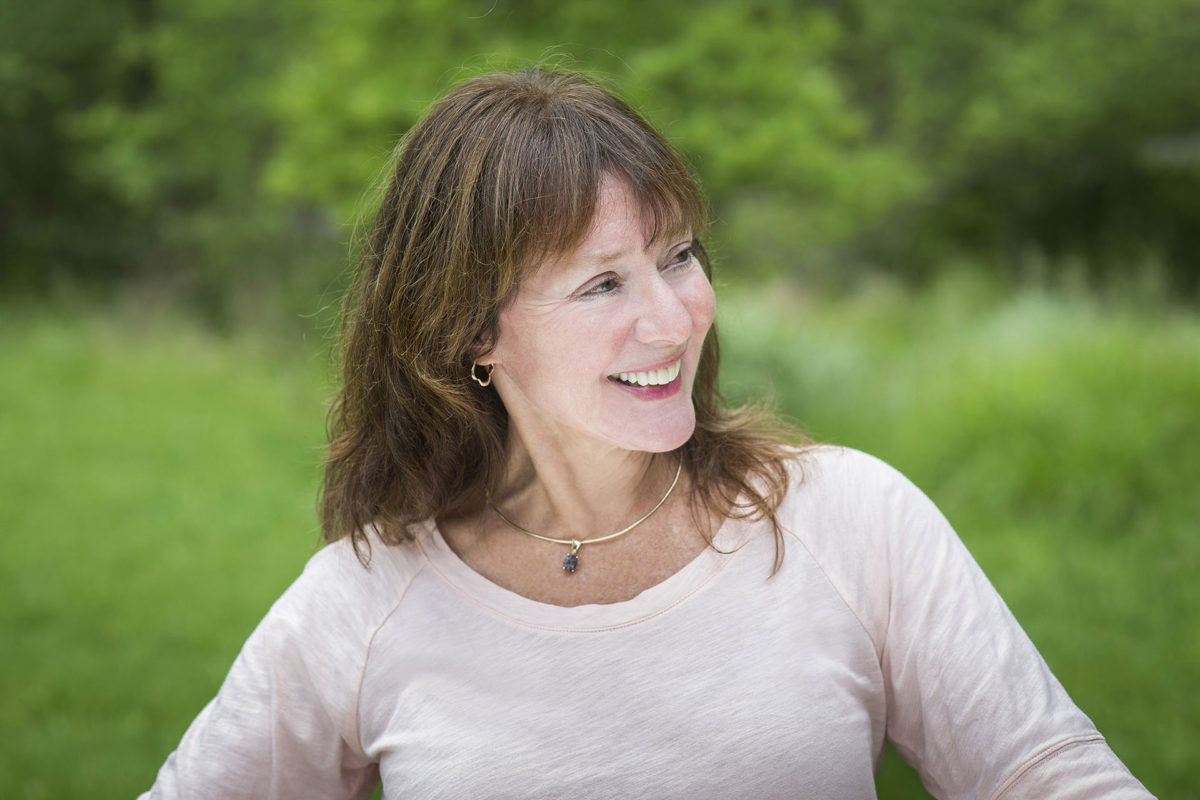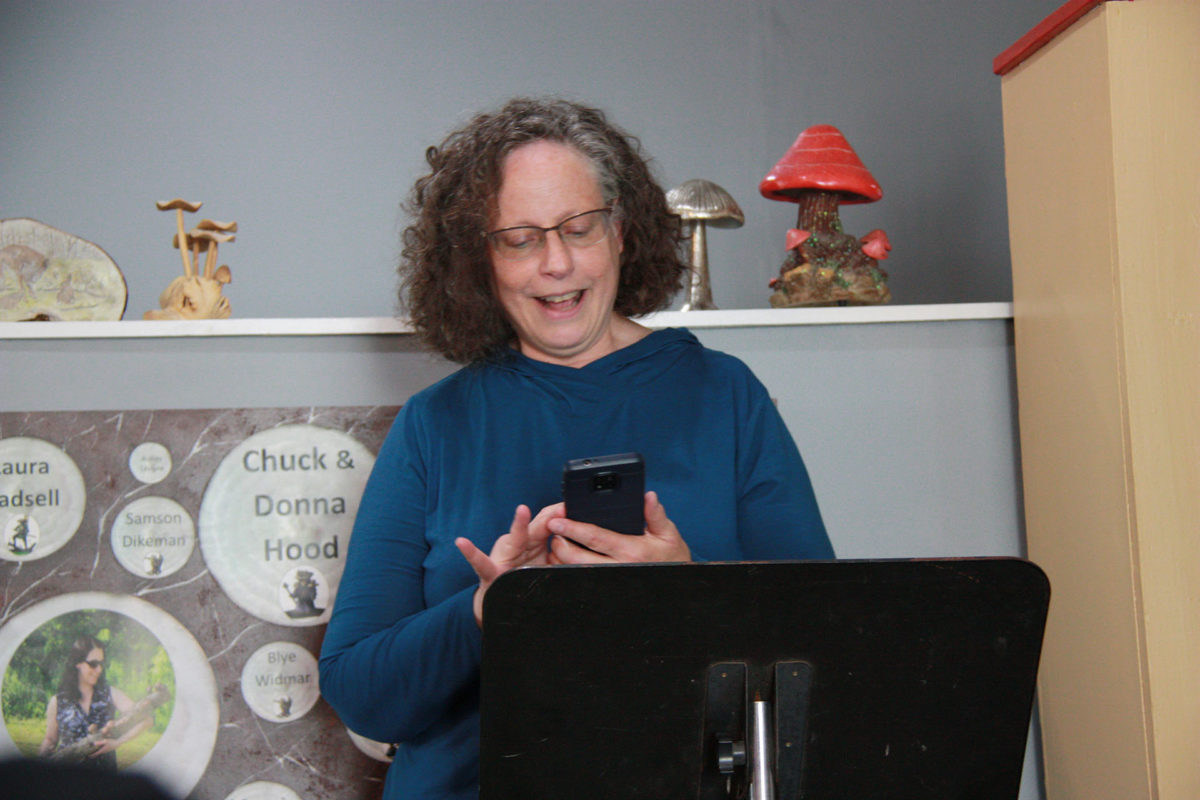Q. You have been involved in the Albany writing scene for decades, can you talk about your role in pivotal ongoing events like Poets in the Park and Third Thursday at the Social Justice Center?
When I moved to Albany in 1986, I was pleased to see that there were some poetry events going on, notably Tom Nattell running the annual Readings Against the End of the World. Soon he began readings & open mics at the QE2, & I eagerly joined in. He was a peace/environmental/social justice activist poet doing the kind of things I wanted to do; he lived only a few blocks from me, we became friends & I would tag along, help carry mic stands, carpool, etc. He began Poets in the Park with the first reading at the Robert Burns statue as part of a series called “Community Poetry/Public Verse.” The first reading was on August 16, 1989 during a full moon eclipse. I was one of the featured readers along with Lyn Lifshin, Sarah Davenport, Amy Halloran, Tony Burroughs, G.E. Schwartz, plus an open mic. When Tom was dying of cancer in 2004 he scheduled himself for Poets in the Park & asked me to be the host. Later he asked me to continue running Poets in the Park. Tom died in January 2005 & I have been organizing the event ever since. This year is our 30th Anniversary!
I started the Third Thursday reading series in the Fall of 1997, having been asked by the owner of Cafe Web on Madison Ave. in Albany to run an open mic there. Since then I have been in 3 other locations, currently at the Social Justice Center, where I have been the longest, since July 2006. I also organize the annual Walt Whitman Birthday Reading of “Song of Myself” also at the Robert Burns statue in Washington Park, & a reading each August 6 of John Hersey’s book “Hiroshima” somewhere in Albany; this was something that Tom also had done a number of times & I decided to pick it up.
Q. What/who/why were you drawn into the writing scene?
I discovered poetry & literature in general outside the classroom when I was in the middle school years, & my interest grew all through high school. I discovered the poetry of Allen Ginsberg, the novels of Jack Kerouac, the other Beat writers, but also the other writers of the mid-20th century, such as Jean Genet, & Samuel Beckett. & the more I read the more writers I discovered. I had a few friends with similar interests & a couple of supportive teachers, but mostly it was discovering writers on my own. When I lived in the East Village in the mid-1970s I had hoped to break into the writers scene, but New York is so big & competitive, everyone’s a superstar in their own movies. But moving to Albany in 1986, I landed at a time just before Tom Nattell began the poetry series & open mics at the QE2. I had landed in a small pond, & if you are a small fish it is better to be in a small pond rather than the ocean.
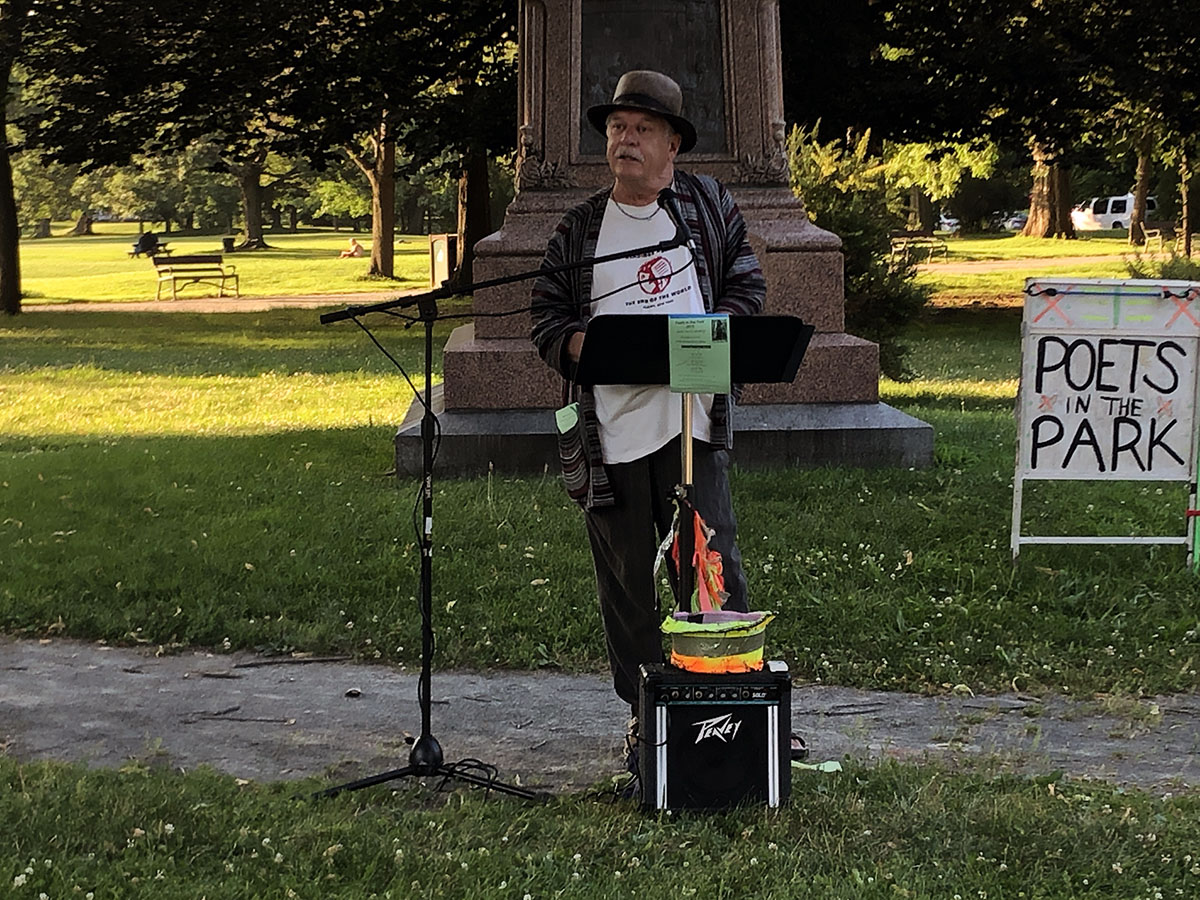
Q. You are well known for your photographs of local poets/writers (https://www.flickr.com/photos/dwlcx/) and I love how you celebrate the poet and the craft by sharing these images. You often travel across the area to support other communities. Can you talk about your photography?
I claim to have “the world’s largest collection of photos of unknown poets.” I haven’t been challenged yet.
When I first discovered the Beat writers, one of the books I bought at the time was “The Beat Scene,” a poetry anthology with photos of the NYC scene by Fred McDarrah. Much later, living in the East Village & going to poetry readings at St. Mark’s & other places I started taking photos of the poets so I could remember who they were. I continued that practice when I moved to Albany in 1986 & at that time I was usually the only person with a camera at readings. Now I have 17 4×6 archive boxes of photos from the days when I used film & many more thousands since I went digital in 2009. On my Flickr site I have over 4500 photos posted, with hundreds of views each month. I always include photos with my Blog on the poetry scene dwlcx.blogspot.com & have had my photos used as the author photo on many poetry collections & for publicity shots.
Back in 1994 a group of us put together a book titled “Open Mic: the Albany Anthology” that contained poems by 41 local poets active at the time, with a photo of each by me, sort of the Albany version of Fred McDarrah’s book.
Some folks have objected to the photo I took of them, but I point out to them that they only looked like that for 1/60th of a second of their lives. Today with most people carrying around smartphones, lots of folks take photos at readings, even taking photos of me, but I keep at it.
Q. You also write a blog about events, which I have been reading for a long time. What I like most about your reviews is how you are opinionated and don’t hold back. Can you talk about your blog and why you keep doing it, even though I am sure you get some backlash?
I’d been keeping notes on the readings I’ve attended since before I moved back to Albany, transcribing the rough notes in my pocket notebook into larger spiral notebooks. When Blogs first came on the scene, I realized that I could use those rough notes to write a Blog & create a public record, & an archive, of the readings I attend. I started my Blog in January 2007, also using it as a place to publish my poems. A year or so later I switched over to a digital camera to more easily post the photos from those readings.
Some people call my postings a “review” but it is more accurately a “report” or a personal reaction. The dirty secret is that there are a few posts that are entirely made up, usually precipitated by an open mic where no one showed. I challenge you to figure out which are the made-up ones, but don’t ask me, at this point I’m no longer sure. Besides, why would anyone believe anything I say?
I’ve actually received over the years very few negative reactions to my posts. Most of my comments on the poems/poets are descriptive & value-neutral. However, where the poet is arrogant, pretentious, stuck on themselves, preachy or long-winded, or where the poet gets their facts wrong (or has no facts), I sharpen my pin to burst their over-blown bubble. There is a comment section on my Blog, but now it is rarely used by folks to post their reactions. Most who are upset by what I say are without a sense of humor, are far-too-serious & think I am as serious as they are; they end up putting their comments on Facebook, 6 paragraphs responding to my 1 sentence comment, going on & on, often threatening me with some kind of action, legal or otherwise, in the light of which they don’t look very good. I don’t respond, I already had my say. As my grandmother famously said, “Opinions are like assholes: everyone has one & they all stink, except your own.”
And as the masthead of my Blog says, “It’s not the truth but it’s pretty darn close.”
Q. In addition to all the work you do in the writing community, you are also a peace activist. Can you discuss your role in Veterans for Peace?
I was a reluctant soldier. I was drafted into the Army in 1969 after graduating from college; I was anti-war before I went into the Army, I was anti-war while I was in, & continue to be anti-war. The government made me a reluctant veteran. Veterans For Peace gives me a way to use my status as a veteran to speak out against war. When people say to me, “Thank you for your service,” I respond, “My real service is working for peace.”
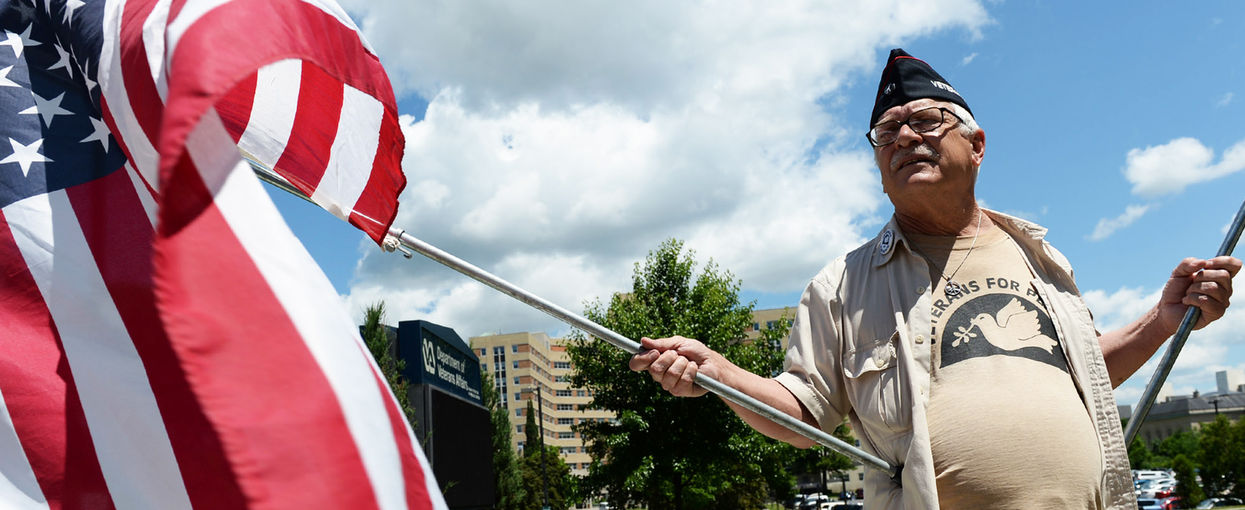
Q. We are living in tumultuous times- is there anything that you would like to say about the polarization in our country? Your thoughts on bringing people together?
Conflict is often necessary to make progress. The welcome changes made in Congress in the 2018 election — more women of color, Native & Muslim women, progressives — was made possible because citizens were shaken out of their complacency. We were reminded that democracy is a participation sport, that just voting ever year, or every 4 years, is not enough, that we need to be active all the time, supporting the causes we believe in, calling & writing to members of Congress & the media, demonstrating. People become polarized when they are frightened & they are usually frightened by what they don’t know. Politicians use this fear to create conflicts even where none exists.
Nichiren Daishōnin (1222 – 1282) (the folks at the Peace Pagoda are in a direct line with the Buddhist sect he founded) wrote in 1275, “Great evil heralds the coming of great good.” This has been my mantra for the last 3 years.
Q. I just read your Baseball Poems, from Scissortail Creative Writing Festival, April 2019, and even though I know little about baseball, what I loved and have always loved about your writing is your ability to tell relatable stories. So much of your work does that and that is why I am a fan. Can you talk about storytelling in poetry and how you approach it?
I’m so pleased that you are a fan, thank you for those comments.
I don’t intentionally set out to write a narrative poem, but it seems to me that all conversation is storytelling. So when I’m writing a poem I’m talking about something & often a story erupts; sometimes it’s just a joke. I also believe that writing needs content, that even extremely “experimental” writing is about something, even if it is just about the writer’s experiment.
Q. With your years of dedication to the writing scene in Albany it is no surprise that you were just named as one of the literary legends by the Albany Public Library Foundation. Can you talk about this honor and the events that will follow?
“Put me a pedestal & I’ll only disappoint you” — Courtney Barnett
I have loved libraries since I was a kid & my children were brought up going to libraries to borrow books & movies & music, & to attend programs. The Albany Public Library Foundation was created to support the work of the Albany Public Library & I have been a supporter of their programs. I have also regularly attended the noontime book reviews of the Friends of the Albany Public Library & have been asked many times to do a review, usually of poetry books or biographies of poets. I was thrilled to be selected, along with Lyn Lifshin & Peter Golden to be this year’s “Literary Legends.” The first Literary Legends were named in 2014 & they were three writers I greatly admire, William Kennedy, Paul Grondahl & Amy Biancolli. Over the years since, all the honorees have been active community members so I feel very honored to be in such activist/literary company. The Foundation’s main fund-raising event, its annual Gala, will be held on October 19 at the Washington Ave. branch of the Albany Public Library. There will be food, drinks, music for dancing, & a few words from each of us. Tickets are on sale now at http://www.albanypubliclibraryfoundation.org/about-us/literary-legends/
Q. Lastly, can you talk about upcoming projects, events, anything, and everything Dan Wilcox
I plan to continue organizing the events I’ve already talked about, & continue to get to as many readings/open mics as I can each month, take my photos, write my Blogs, write poems in between. My main, extended project is writing the history of those early days of the Albany poetry scene, whose title (for now) is “Opening the Mic: a Personal History of the Early Days of the Albany Poetry Scene.” I have been able to put together lists of venues, my sources such as my diaries, notebooks, files, photos, & even a chronological “Time-Track” of all the readings I attended from 1986 to 2007, which is when I started my Blog. I am writing the text in the style of Ed Sanders’ “investigative poetry.” I have to keep moving otherwise someone will throw dirt on me.
